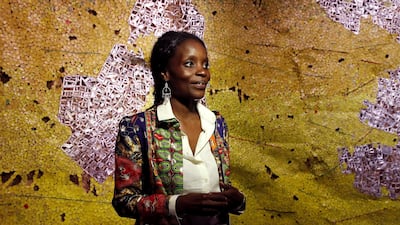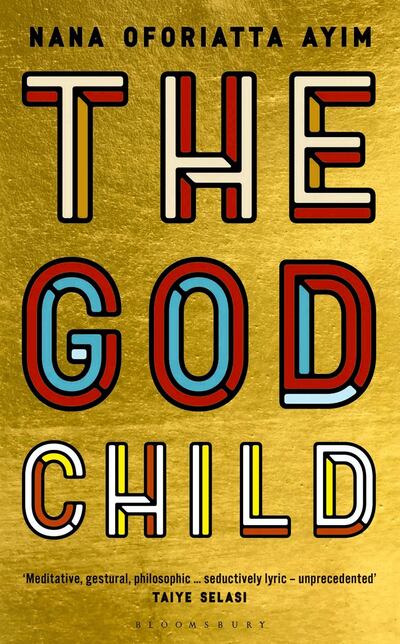While The God Child is Ghanaian writer Nana Oforiatta Ayim's first novel, you might well already be familiar with her name. In 2002, she set up the Ano Institute of Arts & Knowledge in Accra – the city's first gallery space without some kind of colonial history – and in 2017 she was named one of Apollo's 40 Under 40 Global Thinkers. This year, she curated Ghana's first pavilion at the Venice Biennale, while she is also the creator of the pioneering pan-African Cultural Encyclopaedia Project, the aim of which is to map and archive historical and contemporary culture across Africa in 54 volumes (one for each country).
Although she was raised in Europe, growing up in Germany and attending boarding school in England, she moved back to Accra eight years ago and has lived there ever since. We meet in London, though, at the launch of The God Child. It's early November and we're at the Royal Academy of Arts. Looking around at the decidedly white, middle-class audience, this long-standing, rather fusty English institution seems a world away from the more dynamic, intersectional art world that Oforiatta Ayim is at the heart of.
"It's funny," she says. "On the one hand, I was educated in the western system that's so obsessed with documenting and archiving and preserving, but on the other hand, I'm really rooted in my own culture, which has such a different way of historicisation. It's very much about the lived experience. We have objects that are hundreds, sometimes thousands of years old, but they are left for life to eat away at them. Time is not denied in the way it is here. I feel like museums here are mausoleums."
This isn't to say she's immune to their power, though. She recalls going to visit a Mondrian exhibition at Tate Britain as a teenager on a school trip and being "blown away" by seeing so much of an artist's oeuvre in a single, concentrated space. But she's also acutely aware that museums can be "houses of horrors".
Her work, for example, has taken her to plenty of storage spaces packed with African objects, purloined as the spoils of empire. "There's so much energy to them, but they're all stacked up and you feel, 'this is not right. This doesn't feel right.'"
In The God Child, Maya, a Ghanaian woman who spends her childhood and adolescence in Europe, comes to understand her and her family's exile through her relationship with her beloved cousin Kojo. Kojo teaches Maya about how colonialists looted Ghana's treasures, spiriting them away to dusty archives abroad, "sacred objects that had been bought or taken for the entertainment of others".
After returning to Ghana, Maya eventually comes to understand that it's both her duty and her purpose in life to tell her family's story – on her own terms and in her own voice. In doing so, she's premising an internal story "of becoming" rather than the external story that's long been presented to the world, that "of wars and victories and defeats".
Those "linear, monolithic stories of the past, they're just not valid any more", Oforiatta Ayim says.
This sentiment is echoed in the project she's working on in Ghana. It's a mobile museum, an itinerant exhibition in a structure designed by Latifah Idriss, an architect who lives in Accra, that can be taken apart and put on the back of a lorry to tour the country. Constituted by the stories of the people in the communities in which it exhibits, the project challenges traditional ideas of what museum space is.
“Everyone has a story,” Oforiatta Ayim explains. “It doesn’t have to be a person who’s worth millions of pounds and has been hyped up by a certain gallery. There’s a richness and a wealth in each of our narratives.”
So what about her own? She becomes irritated, she admits, when people ask her whether The God Child is autobiographical. For her, writing is at least in part about hiding. But she says that there are some parallels between her and Maya's lives.
She says they both come from illustrious families. Oforiatta Ayim's grandfather was the ruler of one of Ghana's kingdoms, while the country's President, Nana Akufo-Addo, is her cousin. But more significantly, Maya's experience of feeling lost in her English boarding school – her "daily struggle to master the tightrope of existence, or risk falling" – comes from her creator's first-hand experience.
"You see it with Meghan Markle now," Oforiatta Ayim says. "It's to do with race, but also class. You have to act in a certain way or you're just wrong. You're always reminded of the fact you're a black woman, you're never just yourself."
Despite her family's storied heritage, her parents still had to work hard to send her to good schools. "It's the classic immigrant story, struggling to do your best for your children," she says. And so, too, Oforiatta Ayim says she feels a sense of responsibility towards others. "Because of what I do, I've had to become a much more extroverted person," she explains.
She says that as a child she was much more comfortable not being the centre of attention and preferred to be the one in the corner watching others, thus "everything about writing – sitting in a room, not being seen – is a comfort to me".
It's not surprising to learn that she actually began work on The God Child about 10 years ago, long before much of the more public work she's become known for. Writing, she explains, is her first love and it's what she wants to focus on eventually. She's already working on her second novel, a historical epic in the vein of a Ghanaian War and Peace.
But disappearing to an ivory tower to write in peace isn't quite on the horizon yet. "As a young black woman, I don't have the luxury of anonymity because whether I like it or not, there needs to be more of us in the room," she says. "If I extract myself from that, it's an act of selfishness. And everything I'm trying to do is the opposite of that."


